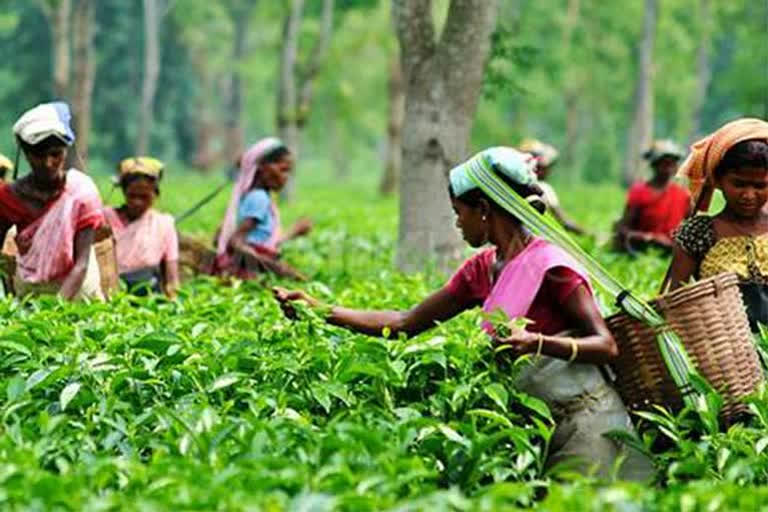Hyderabad: There is good news for your morning cuppa. Tea from West Bengal, especially from the region of Darjeeling, is steadily getting organic. Reduction on use of pesticides and insecticides is the new mantra in the hills and the Terai region.
Allaying the concerns of several tea auctioneers on use of pesticides in tea gardens of the state, things are changing fast and with intent. Before being packed and sent to the market for consumption, be it for the export market or domestic use, tea leaves go through a series of processing.
During the plantation process in the gardens, which dot the entire Darjeeling Hills of West Bengal and the Terai region comprising the districts of Jalpaiguri, Alipurduar, Cooch Behar and parts of Uttar Dinajpur, planters face serious threats from pests and mites. The only saviour is heavy rains, which again, is counterproductive for a good crop.
Tea garden managers like Bhaskar Chakrabarti of the Sukna Tea Garden say Looper Caterpillars are the most common pests of the tea crop in West Bengal. Closely follow Green Flies. Other than these, Red Spots on tea leaves are a major concern for planters.
“Several species of Thrips infest tea and cause heavy damage by feeding on the buds, tender leaves and older tea under plucking. The tea Thrips is a major pest and in India, Thrips cause considerable loss in tipping fields recovering from pruning. We have to deal with them, but under strict guidelines on use of pesticides,” says Chakrabarti.
Sandip Ghosh, manager of Dagapur tea garden in the Terai region shares Chakrabarti's opinion.
“Though some small gardens had the tendency of overusing pesticides, it never happens in big gardens. And these days, even the small gardens have come to know that overuse of pesticides will only lead to cancelation of tea batches and consignments. Nobody will consider tea grown after an overdose of pesticides,” he said.
READ: Haryana, Punjab farmers in a quandary over pesticide ban
The Tea Board of India, the apex organisation under the Union Commerce Ministry has strict guidelines regarding use of pesticides in tea plantation. The Board had teamed up with the Tea Research Institutes (TRIs) in India, Tea Research Association (TRA) for North East India and UPASI Tea Research Foundation (TRF) for South India to formulate a comprehensive tea Plant Protection Code.
The Code complies with food safety standards as stipulated by FSSAI (Food Safety & Standards Authority of India ) and the Plant Protection Formulations (PPFs) recommended for usage were cleared by the Registration Committee of Central Insecticides Board (CIB) formed under the Insecticide Act, 1968, which has the responsibility to check the data requirement of new pesticides and to ensure that pesticides allowed for use will not leave excessive residues on food commodities above the permitted limits.
The Tea Board also keeps on liasoning with international bodies like EPA and FAO and WHO, Codex and other committees on harmonization of pesticide residues.
While formulating the Codes, Tea Board has ensured that planters strictly adhere to the 'Dos and Don'ts in Tea Pest Management' and the 'Guidelines for safe and effective use of Pesticides'
“We can't use pesticides arbitrarily. Non-scheduled pesticides are a strict no for all planters, irrespective of big or small gardens,” says Amritanshu Chakraborty, chief advisor to the Indian Tea Planters' Association.
Among the tea grown in West Bengal, Darjeeling Tea is internationally acclaimed.
“Chemical-free organic products are the demand of the day. So, in Darjeeling, we are ensuring that the Hill gardens go completely organic with use of zero-pesticide. We are hopeful of reaching 100 percent of the target very soon as our tea is mostly exported to countries like the USA, Germany, Japan, Switzerland and the UK. In those countries, the checks are of very high standards and we cannot have any laxity on our part,” Binod Mohan, chairman of Darjeeling Tea Association told Etv Bharat.
READ: Mango farmers divided over government's pesticide ban in Maharashtra
The Darjeeling tea crop is divided into the most cherished First and Second Flush and then the Monsoon and Autumn Flush tea. The entire produce and packing is completed before the pruning of the gardens and setting in of the winters.
Ram Avtar Sharma of the Tea Association of India (TAI) says, pest attacks take place mostly during the months of March and April and sometimes in September.
“In the Terai region, we have to deal with pests and mites with pesticides, But, use of non-scheduled pesticides is banned. Gardens are bound to follow the laid down guidelines of the Tea Board,” Sharma said.
Pesticides like Acephate, Carbendazim, Monocrotophos or 2,4 - Dichlorophenoxyacetic Acid are things of the past and have been put out of use in the tea gardens by the planters. Most of them are heavily leaning on organic solutions by making their own formulations using herbs and other weeds. Use of cow dung, neem extracts, mustard paste residue, neem oil and Azotobacter bacteria are commonly used as alternatives to chemicals to reduce pest attacks in tea gardens.
The tea industry of West Bengal is actually on the path of going Green. Soon, tea connoisseurs will say that there is hardly a sip between the cup and the lip.



